#seder in the streets
Video
youtube
The Majority Report w/ Sam Seder
9/12/2022
Big Tech's Wall Street Behemoth w/ Jeremy Gilbert, Alex Williams
Sam hosts Jeremy Gilbert, Professor of Cultural and Political Theory at the University of East London, and Alex Williams, lecturer in digital media and society at the University of East Anglia, to discuss their recent book Hegemony Now: How Big Tech and Wall Street Won the World (And How We Win it Back).

Today power is in the hands of Wall Street and Silicon Valley. How do we understand this transformation in power? And what can we do about it?
We cannot change anything until we have a better understanding of how power works, who holds it, and why that matters. Through upgrading the concept of hegemony—understanding the importance of passive consent; the complexity of political interests; and the structural force of technology—Jeremy Gilbert and Alex Williams offer us an updated theory of power for the twenty-first century.
Hegemony Now explores how these forces came to control our world. The authors show how they have shaped the direction of politics and government as well as the neoliberal economy to benefit their own interests. However, this dominance is under threat. Following the 2008 financial crisis, a new order emerged in which the digital platform is the central new technology of both production and power. This offers new opportunities for counter hegemonic strategies to win back power. Hegemony Now outlines a dynamic socialist strategy for the twenty-first century.
#The Majority Report w/ Sam Seder#us politics#90s#neoliberalism#capitalism#jeremy gilbert#alex williams#big tech#climate change#Hegemony Now: How Big Tech and Wall Street Won the World
10 notes
·
View notes
Text

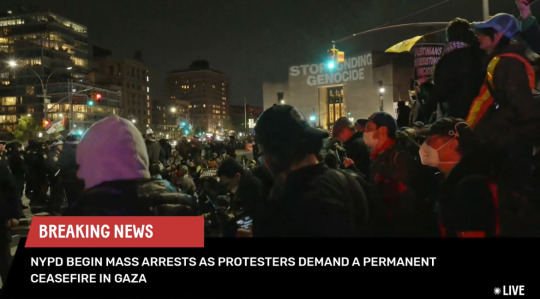
HAPPENING NOW: mass arrests at the seder in the street protest outside of sen schumer's apartment continue, there are hundreds of people there, and they aren't budging.
#free palestine#end aid to israel#current events#palestine genocide#let gaza live#west bank under attack#save palestine#bds movement#end the genocide#end the occupation#jewish voice for peace#if not now#jews for racial & economic justice nyc#new york city#boycott divest sanction#from the river to the sea#free palestine in our lifetime
150 notes
·
View notes
Text
It is easy to make jokes about the Eastern European and Jewish prerogative about food. It is not so easy when you know both groups have been literally starved to death through no fault of their own.
It is easy for someone to say "why didn't they just leave" but not so easy knowing because these murders by starvation were intentional, the victims were actively prevented from leaving. Which in itself is proof it was intentional for these people to starve to death.
If you want us to believe something like the Holodomor was a natural famine you shouldn't also tell us about internal passports (something many countries have done in order to keep an eye on where their "undesirables" are going) and people being shot for trying to board trains, planes, busses, and carriages. If, instead, it was natural, why stop people from going somewhere that there IS food?
Through the lens of epigenetics we can begin to understand why a third generation American of EE/Jewish descent might have this anxiety about food, about making sure there is enough, that we remember those who are less fortunate, that we appear to subsist entirely on leftovers. Or, indeed, why many with these epigenetic changes tend to trend towards higher percentages of body fat. Our bodies through our genes remember a time nobody could be even a pound overweight and it knows that the body literally eats itself as we starve and the first to go of course is body fat so our bodies, knowing all this, make sure we have extra "God forbid (ptoo ptoo ptoo), just in case".
"They tried to kill us, they failed, let's eat" isn't just a pithy saying. We outlived them even despite being unable to eat. We do not hoard food, we just happen to have a lot of leftovers through this anxiety about food. "Oy, I ate too much" is a blessing. With it, we are aware of how few times our ancestors could say the same. During Pesach (Passover), we have an entire dinner party (complete with perhaps a little too much wine) and recline in style as we eat matzo and remember why it is just so damn flat (we rushed off to escape from Egypt without finishing making our dough. D'oh!). Everything on the seder plate has a meaning, with some items being added or removed based on the traditions of the family or congregation doing the seder. Such as in the past couple years the olive is added to symbolize the hope for peace in Ukraine (or, for some, peace in the Middle East). Or the orange to symbolize the inclusion of the LGBTQ community.
Perhaps it seems paradoxical to eat so much in one sitting instead of saving some for a time where food may be scarce. But it goes hand in hand with "They tried to kill us, they failed". We have survived another day and have enjoyed good food and good company. In spite of everything they did to us. We feast out of spite. Perhaps because of all those times our enemies were eating without a care in the world while our ancestors watched and starved. We have proof of commie buffets while starving Ukrainians watched from the street. We have proof of Jews being teased with food, with Gentiles tossing heels of bread on the ground so they could watch as said Jews fought over it or flinging a sausage and laughing as Jews raced to get it as if they were playing fetch with a dog. Or the innumerable times people were killed for stealing a handful of grain when many times they were the ones who had farmed the grain in the first damn place.
There are many who do not see starvation as a tool of genocide. They don't understand how starvation can break a community. Death by Hunger, the translation of Holodomor, was not about control like people claim (in other words they claim the death was an accident, that the starving was meant to keep people in line. If they had just behaved themselves they wouldn't have died etc.,). It was always and forever about a stronger group ridding the world of another group without getting literal and metaphorical blood on their hands. They could cite plausible deniability. It wasn't their fault, honest, it was just bad luck.
The stereotypical scene of people in lines that stretch multiple city blocks was in fact the norm. And more often than not, only the first few dozen would get anything at all and everyone else would find they had wasted an entire day waiting for food that was never meant to be given to them in the first place. The supply was purposely small. At least for those who were either too low in the Party or not a part of it at all. For Jews, you turned to the black market which was often caught selling spoiled food as well as food that wasn't actually food at all (such as sawdust masquerading as bread). Which happened even with regular stores because as a Jew you could only buy certain things and everyone knew it and still would not sell the genuine article because why should they? It is, after all, going to a Jew. Soviet areas were guilty of doing this to everyone, too.
So if you are visiting an EE and/or Jewish home and they actively push food on you and insist you take leftovers, that is their love language. We want you to have enough because far too many times our people did not. And in Jewish culture, it is a literal mitzvah to provide food to those who cannot procure it themselves either because of money/access, or they are going thru the bereavement process or otherwise incapable of dealing with making sure they have something to eat (such as an illness that prompts them being added to the Mi Shebeirach list which in many congregations is printed and given out to refer to during the Mi Shebeirach prayer during services and may also be paired with the mourner's kaddish list). It is why when you go to a house where the occupants are sitting Shiva, you will often find their kitchen stacked with tupperware of varying sizes and cuisine and you will often be instructed to bring something as well though it isn't a requirement. Generally, your presence is considered the more important aspect of the Jewish bereavement process. (Just do not say you are going to sit Shiva with someone. Rather, you are paying a Shiva call or condolence call. Only the mourners are in fact sitting Shiva. Also important: try the door first before ringing or knocking, as usually that is seen as an interruption to sitting Shiva which is frowned upon. And do not literally call them unless told otherwise for the same reason.)
Food makes or breaks us. Food is not inherently moral or immoral. And yes, perhaps there is always room for dessert. And maybe we do eat too much but that's okay. We have survived to enjoy it, so let us do so. Nu, it is what our ancestors would want.
#anti communism#holodomor#judaism#jumblr#ukrainian#culture#food mention#the holodomor was genocide#genocide tag#gosh i went all over the place in this didn't i#i'm sorry it started storming and i was hiding out in the bath tub trying to get my lower body to stop screaming in pain lmao#long post#anyway chag pesach sameach
927 notes
·
View notes
Text
"On the night of April 19 I entered the house at 4 Kurza Street to get flashlights for our men. Wandering about there, I unexpectedly came upon Rabbi Maisel. When I entered the room, I suddenly realized that this was the night of the first Seder.
The room looked as if it had been hit by a hurricane. Bedding was everywhere, chairs lay overturned, the floor was strewn with household objects, the window panes were all gone. It had all happened during the day, before the inhabitants of the room returned from the bunker.
Amidst this destruction, the table in the centre of the room looked incongruous with glasses filled with wine, with the family seated around, the rabbi reading the Haggadah. His reading was punctuated by explosions and the rattling of machine-guns; the faces of the family around the table were lit by the red light from the burning buildings nearby.
I could not stay long. As I was leaving, the Rabbi cordially bid me farewell and wished me success. He was old and broken, he told me, but we, the young people, must not give up, and God would help us.
He also gave me several packages of matzos for my comrades. Should we all survive until morning, he said, I should come again and bring with me Zivia. I fulfilled his wish, and next evening I paid the rabbi another visit, this time in the company of Zivia."
Tuvia Borzykowski, Between Tumbling Walls, 57-18; regarding the night of April 19, 1943: the first full night of the Warsaw Ghetto Uprising, and the first night of Passover.
112 notes
·
View notes
Text
40s!headcannons - steve & bucky
pairings: steve rogers x reader, bucky barnes x reader
summary: headcannons of steve and bucky from the 40s.
w/c: 645
content warning: minor angst, mentions of domestic/child abuse, fluff, mention of smoking/drinking.

Steve Rogers
Steve always being shy to show affection, for fear of rejection. So whenever you initiate acts of affection, he goes red and his heart does somersaults.
He doesn't like to talk about his dad much, it still hurts to think about the abuse he and his mom faced because of him.
But he sometimes misses the way his dad was before the abuse started but he feels wrong for missing someone who caused so much pain.
Steve first learned how to draw from recreating the human anatomy because he had a curiosity for medicine, taking after his mother who was a nurse.
Steve learned how to do everything around the house- cooking, cleaning, hell he even knew how to sew. His mother had instilled the importance of knowing how to take care of yourself within him at a young age.
Coming from Irish-Catholics, he and his mother would attend mass frequently.
Steve loved midnight Christmas mass the most.
Loved reading and saving up to buy new books and comics.
Was the type of kid to hide underneath the covers with a flashlight just so that he could read late at night.
He memorized the entire subway system at one point.
His favorite places to take you on dates would be parks and record shops.
Textbook definition of a gentleman, would open every door for you, walk closest to the street, give you his jacket if your cold, and drop you off at your doorstep after a date.
After the serum, he still wasn't used to his new body so he would still accidently buy clothes that were too small.
Steve wrote to you and told you everything about what he was doing while away.
This man would lose his mind every time you sent him a photo of yourself in your letters.
Worshipped the ground you walked on and treats you nothing short of a queen.
He was afraid that his inexperience would be an issue and after reassuring him that it wasn't he fell even deeper in love with you.
Needless to say Steve loved learning new things with you ;)
Bucky Barnes
Bucky was openly affectionate and it often meant that you would get dirty look from girls who had a crush on him because they were jealous that Bucky was paying to attention to you.
Bucky is Jewish (especially considering that his character is based on another Jewish character/has Jewish influences)
He would invite Steve over for Seder dinners every year.
Bucky cannot cook to save his life, his role in the kitchen often being helping cut veggies or wash dishes.
Bucky was a naturally loud person seeing as he lived with four sisters and had an all around loud household/family.
Bucky picked up street-boxing when he was 13.
Steve hated this. Often having to be the one to patch up Bucky after a nasty fight.
Bucky could understand and even speak a little bit of Spanish, learning from friends and from girls he'd dated before.
Bucky would sneak up the fire escape to be able to knock on your window and see you late at night.
Bucky smokes, but never around you or Steve out of respect.
He is a sappy drunk. He will go on and on about how much he loves you and how beautiful you are.
He can handle his liquor.
He loved going dancing with you- especially at jazz clubs.
An absolute sucker for rhythm and blues.
He knew that he wanted to marry you, but he wanted to wait until after the war to get married.
He had the ring picked and locked away.
He kept a picture of you tucked away in his coat pocket, admiring the picture everyday while overseas.
He wrote to you often, asking about how things were back home. Your responses giving him hope that this war would end soon and he's come back home to you.
#40s bucky#40s steve rogers#bucky barnes#captain america#steve rogers#pre serum steve#bucky barnes x reader#steve rogers x reader#bucky barnes fanfiction#steve rogers fanfiction#fluff#slight angst#marvel
138 notes
·
View notes
Text
Pro-Palestine Speech Is THE MOST Policed Speech
#palestine#free palestine#gaza#free gaza#gaza strip#israel is a terrorist state#israel#current events#genocide#important
22 notes
·
View notes
Text
youtube
Naomi Klein: Jews Must Raise Voices for Palestine, Oppose "False Idol of Zionism" - April 24, 2024
@democracynow:
Hundreds of protesters were arrested in Brooklyn on Tuesday when Jewish New Yorkers and allies gathered for what they called a "Seder in the Streets to Stop Arming Israel" on the second night of Passover. The demonstration, held one block away from the home of Senate Majority Leader Chuck Schumer, came just hours before the Senate overwhelmingly approved a $95 billion foreign aid package that includes about $17 billion in arms and security funding to Israel. "Too many of our people are worshiping a false idol," said award-winning author and activist Naomi Klein, one of several speakers at Tuesday's rally. "They are enraptured by it. They are drunk on it. They are profaned by it. And that false idol is called Zionism." Democracy Now! is an independent global news hour that airs on over 1,500 TV and radio stations Monday through Friday. Watch our livestream at democracynow.org Mondays to Fridays 8-9 a.m. ET. Subscribe to our Daily Email Digest: https://democracynow.org/subscribe
The US Jewish movement opposing Israeli war crimes is truly moving. God bless them.
#jumblr#israel#Palestine#am yisrael chai#history#white history#chuck schumer#democrats#Jewish Voice for Peace#Beth Miller#Naomi Klein#Youtube#Seder#passover
8 notes
·
View notes
Text
"What I want to say to you tonight at this revolutionary and historic Seder in the Streets is that too many of our people are worshipping a false idol once again. They are enraptured by it. Drunk on it. Profaned by it.
That false idol is called Zionism.
Zionism is a false idol that has taken the idea of the promised land and turned it into a deed of sale for a militaristic ethnostate
It is a false idol that takes our most profound biblical stories of justice and emancipation from slavery – the story of Passover itself – and turns them into brutalist weapons of colonial land theft, roadmaps for ethnic cleansing and genocide.
It is a false idol that has taken the transcendent idea of the promised land – a metaphor for human liberation that has traveled across multiple faiths to every corner of this globe – and dared to turn it into a deed of sale for a militaristic ethnostate.
Political Zionism’s version of liberation is itself profane. From the start, it required the mass expulsion of Palestinians from their homes and ancestral lands in the Nakba.
From the start it has been at war with dreams of liberation.
....
Zionism is a false idol that has betrayed every Jewish value, including the value we place on questioning – a practice embedded in the Seder with its four questions asked by the youngest child.
Including the love we have as a people for text and for education.
Today, this false idol justifies the bombing of every university in Gaza; the destruction of countless schools, of archives, of printing presses; the killing of hundreds of academics, of journalists, of poets – this is what Palestinians call scholasticide, the killing of the means of education."
#palestine#free palestine#isreal#gaza#apartheid#genocide#colonization#american imperialism#settler colonialism#settler violence#naomi klein
9 notes
·
View notes
Text

George Rinhart. The street of David, Jerusalem. Undated. :: [Mikhail Iossel]
* * * *
“One of the questions asked by al-Balkhi, and often repeated to this day, is this: Why do the children of Israel continue to suffer? My grandmother Dodo thought it was because the goyim were jealous. The seder for Passover (which is a shame-faced simulacrum of a Hellenic question-and-answer session, even including the wine) tells the children that it's one of those things that happens to every Jewish generation. After the Shoah or Endlösung or Holocaust, many rabbis tried to tell the survivors that the immolation had been a punishment for 'exile,' or for insufficient attention to the Covenant. This explanation was something of a flop with those whose parents or children had been the raw material for the 'proof,' so for a time the professional interpreters of god's will went decently quiet. This interval of ambivalence lasted until the war of 1967, when it was announced that the divine purpose could be discerned after all. How wrong, how foolish, to have announced its discovery prematurely! The exile and the Shoah could now both be understood, as part of a heavenly if somewhat roundabout scheme to recover the Western Wall in Jerusalem and other pieces of biblically mandated real estate.
I regard it as a matter of self-respect to spit in public on rationalizations of this kind. (They are almost as repellent, in their combination of arrogance, masochism, and affected false modesty, as Edith Stein's 'offer' of her life to expiate the regrettable unbelief in Jesus of her former fellow Jews.) The sage Jews are those who have put religion behind them and become in so many societies the leaven of the secular and the atheist.”
― Christopher Hitchens, Hitch 22: A Memoir
9 notes
·
View notes
Text
found out that we aren't having a real seder again this year because my mom is too busy AND they're playing loud obnoxious bad christian music at the church across the street. i'm being oppressed
#the printed out shank bone thing from last year was funny the first time but it's just gonna be sad this year#tick biz
15 notes
·
View notes
Text
NAOMI KLEIN
April 24, 2024
My friends, I’ve been thinking about Moses and his rage when he came down from the mount to find the Israelites worshiping a golden calf. The ecofeminist in me has always been uneasy about this story. What kind of god is jealous of animals? What kind of god wants to hoard all the sacredness of the Earth for himself? But there is, of course, a less literal way of understanding this story. It is a lesson about false idols, about the human tendency to worship the profane and shining, to look to the small and material rather than the large and transcendent.
What I want to say to you this evening at this revolutionary and historic Seder in the Streets is that too many of our people are worshiping a false idol once again. They are enraptured by it. They are drunk on it. They are profaned by it. And that false idol is called Zionism.
It is a false idol that takes our most profound biblical stories of justice and emancipation from slavery, the story of Passover itself, and turns them into brutalist weapons of colonial land theft, roadmaps for ethnic cleansing and genocide. It is a false idol that has taken the transcendent idea of the Promised Land, a metaphor for human liberation that has traveled across faiths to every corner of this globe, and dared to turn it into a deed of sale for a militarist ethnostate.
Political Zionism’s version of liberation is itself profane. From the start, it required the mass expulsion of Palestinians from their homes and ancestral lands in the Nakba. From the start, it has been at war with collective dreams of liberation. At a seder, it is worth remembering that this includes the dreams of liberation and self-determination of the Egyptian people. This false idol of Zionism has long equated Israeli safety with Egyptian dictatorship and unfreedom and client state. From the start, it has produced an ugly kind of freedom that saw Palestinian children not as human beings, but as demographic threats, much as the Pharaoh in the Book of Exodus feared the growing population of Israelites and thus ordered the death of their sons. And as we know, Moses was saved from that by being put in a basket and adopted by an Egyptian woman.
Zionism has brought us to our present moment of cataclysm, and it is time that we say clearly it has always been leading us here. It is a false idol that has led far too many of our own people down a deeply immoral path that now has them justifying the shredding of core commandments — “Thou shall not kill,” “Thou shall not steal,” “Thou shall not covet” — the commandments brought down from the mount. It is a false idol that equates Jewish freedom with cluster bombs that kill and maim Palestinian children.
Zionism is a false idol that has betrayed every Jewish value, including the value that we place on questioning a practice embedded in the seder itself with its four questions asked by the youngest child. It also betrays the love that we have as a people for text and for education. Today this false idol dares to justify the bombing of every single university in Gaza, the destruction of countless schools, of archives, of printing presses, the killing of hundreds of academics, scholars, journalists, poets, essayists. This is what Palestinians call scholasticide, the killing of the infrastructure and the means of education.
Meanwhile, in this city, the universities call the NYPD and barricade themselves against the grave threat posed by their own students asking them... questions like “How can you claim to believe in anything at all, least of all us, while you enable, invest in and collaborate with this genocide?”
The false idol of Zionism has been allowed to grow unchecked for far too long. So tonight we say it ends here. Our Judaism cannot be contained by an ethnostate, for our Judaism is internationalist by its very nature. Our Judaism cannot be protected by the rampaging military of that ethnostate, for all that military does is sow sorrow and reap hatred, including hatred against us as Jews. Our Judaism is not threatened by people raising their voices in solidarity with Palestine across lines of race, ethnicity, physical ability, gender identity and generations. Our Judaism is one of those voices and knows that in this chorus lies both our safety and our collective liberation.
Our Judaism is the Judaism of the Passover Seder, the gathering in ceremony to share food and wine with loved ones and strangers alike. This ritual, light enough to carry on our backs, in need of nothing but one another, even with — we don’t need walls. We need no temple, no rabbi. And there is a role for everyone, including especially the smallest child. The seder is portable, a diaspora technology if ever there was one. It is made to hold our collective grieving, our contemplation, our questioning, our remembering, and our reviving and rekindling of the revolutionary spirit.
So, tonight — so, look around. This here is our Judaism. As waters rise and forests burn and nothing is certain, we pray at the altar of solidarity and mutual aid, no matter the cost. We don’t need or want the false idol of Zionism. We want freedom from the project that commits genocide in our name. We want freedom from the ideology that has no plan for peace, except for deals with the murderous, theocratic petrostates next door, while selling the technologies of robo-assassinations to the world. We seek to liberate Judaism from an ethnostate that wants Jews to be perennially afraid, that wants our children afraid, that wants us to believe that the world is against us so that we go running to its fortress, or at least keep sending the weapons and the donations.
That is a false idol. And it’s not just Netanyahu. It’s the world he made and the world that made him. It’s Zionism. What are we? We, in these streets for months and months, we are the exodus, the exodus from Zionism. So, to the Chuck Schumers of this world, we do not say, “Let our people go.” We say, “We have already gone, and your kids, they are with us now.”
6 notes
·
View notes
Note
So, hey. How did you and your family celebrate Passover when you were a kid? How about now?
My Rhode Island aunt and uncle almost always hosted a big family Seder, and it was the absolute best. A good Seder is educational, food-filled, and legit fun—it's a ritual meal that includes storytelling, singing, prayers, and a general focus on including and teaching everyone involved, regardless of age or even whether attendees are Jewish. (If ever you're invited to a friend's Seder, go! Do not bring a challah, which my actually-bar-mitzvahed brother-in-law did once as an attempt at a thoughtful host gift. We still make fun of him.)
And my uncle (the same one who officiated at my wedding, and the wedding of my other sister) may well be the greatest host/leader there is; over the years he compiled from a medley of sources what added up to his own Haggadah (basically the guidebook to the Seder—there are a million published and informal versions working off the same template, with readings and activities and interpretations that can go kid-centric or feminist or traditional or whatever). It was always just insanely fun, and warm, and joyous, with incredible food and an increasing array of baked-in, just-us traditions.
Since I went to college basically down the street from their house, and then lived just an hour away in Boston for so long, that was pretty much the heart of my and my family's celebration most years—right up until Passover 2020, at which point the pandemic negated what had been plans to travel from our new home in Illinois for it, and they also downsized and had their own kids scatter geographically and gain very little ones, so that particular tradition is at best on hiatus now.
But there are fun Seders everywhere—well, the Zoom ones of the pandemic years were a mixed bag, but we've found friends who've make a good go of it, over the years, too, if not quite as an elaborately planned out hourslong celebration as my uncle would do. When I studied abroad in Denmark, Boyfriend and I went to an Orthodox Seder that was in a mix of Danish and Hebrew, for instance—that was novel, and so much of the procedure and the Hebrew was familiar enough to follow along.
Still working on exactly where we'll be for those two nights this year (we haven't really met any Jewish families in Pittsburgh yet to garner an invite, and none of the Reform or Conservative synagogues seem to have community events, which is surprising? And I don't really want to go to Chabad?) but we'll figure something out.
That said, as fun as the Seders can and should be, the rest of Passover is a slog of not eating bread or adjacent products, and experiencing whatever it is matzah does to one's digestive system over the course of a week. It's a meaningful observance, and the fact that the relevant rabbinical boards have stopped including rice and legumes in the "no" column in recent years has been great, but...it's ultimately a holiday recalling the story of the Exodus, and how we were slaves once, so, like, there are some less-fun elements. But the freedom celebration parts usually outweigh that!
#ask me ask me ask me#stpauligirl#passover#pesach#jews!#jewish holidays generally have fairly set observances and the details come down to your family/community/congregation#as well as interpretation and denomination and general religiosity#but basically anyone celebrating passover will be doing some seders and no bread and lotsa matzah#and no it will never stop being amusing how often goyim seem to enjoy eating matzah and how jews *always* eat an assload and do not enjoy i#i'm sure it's because it's an imposed week out of the year and not a novel cracker alternative but anyway#a potentially amusing sidenote:#boyfriend has been in the picture since the beginning of college and always came to the family seder thereafter#the first time he remembered that his mom told him not to go to someone's house empty-handed and procured (in lieu of flowers or whatever)#a moses action figure which then graced that seder table proudly from 2006 onward#'moshe rabenu' also made an obvious and necessary appearance at our wedding#and another tidbit for the jews here#the first covid seder i'd seen someone do this on the internet somewhere#and so for the zoom seder made a separate account labeled 'eliahu ha'navi' and had it request admittance at the appropriate moment#got a BIG laugh. still pleased about pulling that off.
13 notes
·
View notes
Text

IN ONE HOUR: JEWISH NEW YORKERS AND OTHER PRO PALESTINE ALLIES, SHOW UP FOR SEDER IN THE STREETS TONIGHT AT 5:30, OUTSIDE SEN. SCHUMER'S APARTMENT AT GRAND ARMY PLAZA!
#free palestine#end aid to israel#current events#palestine genocide#let gaza live#west bank under attack#save palestine#bds movement#end the genocide#end the occupation#call to action#brooklyn#new york city#boycott divest sanction#from the river to the sea#free palestine in our lifetime#no one is free until we are all free
57 notes
·
View notes
Text
Preparing for the High Holy Days in Algiers
As the first fruits of they year appeared in the street markets, Jewish housewives busied themselves preparing festive dishes, jams and jelly for the High Holy Days. The chidren enjoyed waffles, biscuits and ice cream. Caroline Elisheva Rebouh shares her memories of childhood in Algiers in the Morial newsletter (With thanks: Leon):
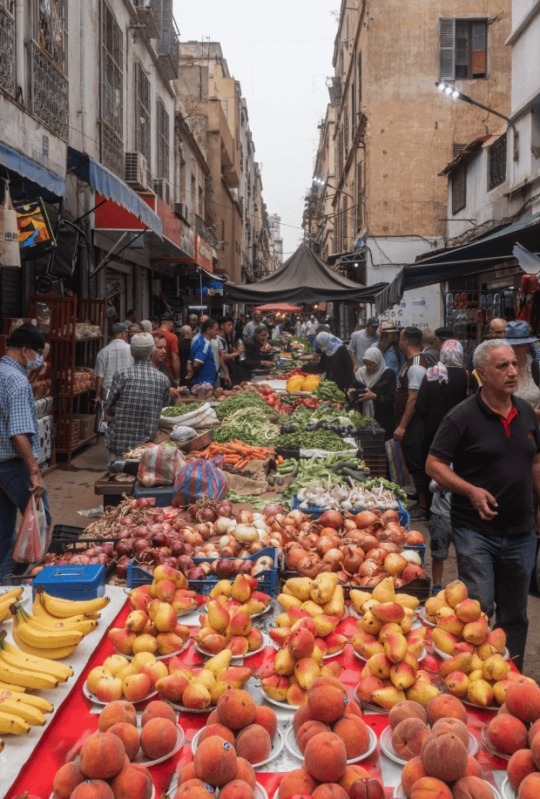
Algerian street market
In the last days of the summer holidays, mothers were busying themselves with the household chores in readiness for the Jewish High Holy Days of Rosh Hashana, Yom Kippur and Succot.
The families gathered around festive meals. They needed to prepare traditional dishes in advance for guests to sample, and especially pre-prepared confectionery and pastries. At the time, few of us had a refrigerator.
The markets overflowed with fruit of all kinds: housewives selected quinces, white-flesh sweet potatoes, figs, and pinkish grapes.
The quinces were chosen carefully to be almost sure that they were not “visited” by unwanted worms. They were rinsed, peeled and cut into quarters – hard to do as the fruit was hard. The seeds were removed and reserved separately for jam and quince jelly. People loved it at the end of the Yom Kippur fast!
The fruits were boiled to soften the flesh so that the sugar syrup seeped into the flesh of the fruit and the sugar remained clear. It was during this operation that the seeds (quince cores) were added so that the pectin let the syrup gel. Some of the boiled quinces were cooked over low heat. During the prolonged simmering, sugar was added in small quantities, while the mix was stirred to make a fruit paste.
The figs were also quickly turned into a light-coloured and appetizing jam.
The grapes: we chose a variety called “bou amar” : the grapes were round, relatively large and pink. Mothers armed their children with fresh feathers to deseed the grapes. The jam was also pinkish and pleasant, and some mothers would wrap the seeds of the grapes in fresh compresses to make jelly.
A little later there would appear small apples of a very pale green and with light pink spots on the side which were used for the Rosh Hashanah seder and which were called Kabyle apples. Small white and pink peaches with firm, tender and fragrant flesh were also called Kabyle (Berber) – no doubt coming from Kabylia.
In Algiers, we children ignored the entire selihoth period. We only experienced the season through the pleasure of tasting small amounts of candy floss, fine biscuits and other delights.
During and at the end of summer, small stalls “flowered” on street corners: the yaouled (children or young teenagers) offered us freshly-picked prickly pears which they peeled with dexterity and presented them on fig tree leaves so that our little fingers did not touch the thorns. Other yaouled offered grilled corn on the cob: we savoured them on the benches in the public gardens where we played with our cousins, neighbors and classmates.
From time to time, we gathered around small confectioners who tempted us with sugar of different colours which they sold in small quantities. We sucked them by holding them between our fingers and then crunched our teeth on them.
The waffle merchants announced their passage by waving wooden boards with handles on both sides. festooned with mini-shutters which tinkled with a dry and dull sound.
At that time we liked our waffles a little thicker than ice cream cones. They were rolled up in cones and stacked in a sort of cylinder about one meter high. The merchant placed it at ground level to serve his young customers.
But fine biscuits weren’t the only popular waffles: at Grosoli, a popular ice cream parlor in Algiers, the ice cream cups were decorated with a fan or a fine rolled biscuit.The Bitone company also marketed what were called “funny wafers” : they carried short slogans like “You won” or “I love you”.
When many years later we found ourselves in Marseille, we could no longer find ice creams like those of Algiers.
Read article in full
14 notes
·
View notes
Text
chag sameach and happy chuseok!
This year, for the first time ever, I built a sukkah. It was tough. I'm not going to lie, even doing it on the cheap it was expensive. There was a lot of hot, hard work.
But I am so, so proud of myself.
I put in the effort to make sure my kids have access to both of their cultures through me, and then I got a shady hut to sit in this last week. I also am making sure to be visibly, loudly, publicly all my selves, so another queer, neurodivergent, mixed race Asian Jew out there knows they aren't the only one.
For those who don't know, Sukkot is a Jewish harvest-time festival celebrating the harvest with some ancestor veneration. It's not a big deal holiday anymore, but it was one of the three pilgrimage festivals during Temple times. I've seen lovely photos of streets in eretz yisrael lined with many sukkot. Chuseok is a Korean harvest-time festival celebrating the harvest with some ancestor veneration. It's not such a big deal holiday anymore, but many people still use it as a time to travel and spend time with living relatives. I hear tell of planes and hotels being booked out for months and traffic being horrendous as people roadtrip to childhood or ancestral hometowns.
Here's some photos of mixed race Jewish Korean queer joy. If you follow the link at the bottom, you can watch the video with voiceover on my instagram. (I could download the video, but because I added the theme from Practical Magic behind my words instagram wouldn't let me download my own voice.)
Come with me and enjoy!

Image description: a light skinned mixed race person with dark hair and eyes, large dark green glasses, a white kerchief, and a light blue jeogori with dark blue collar and cuffs and white dongjeong smiles at the camera, gesturing with one hand upwards and back to the grass fence sukkah wall behind them.
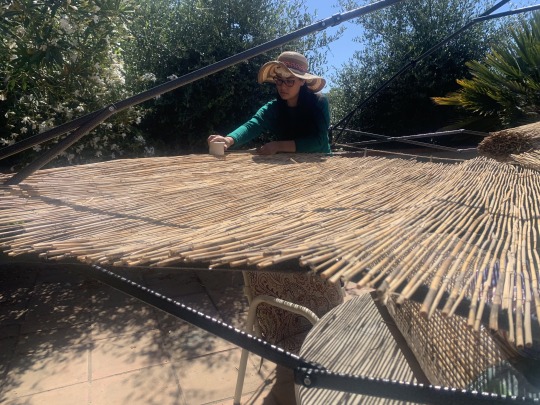
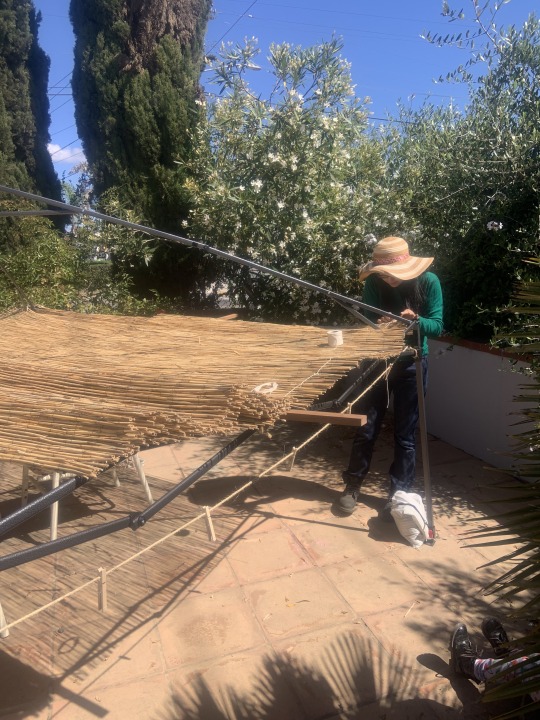
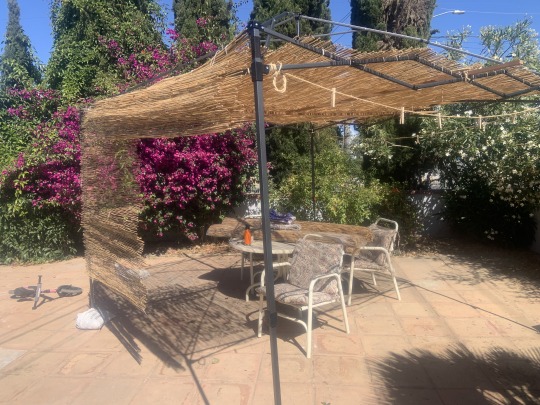
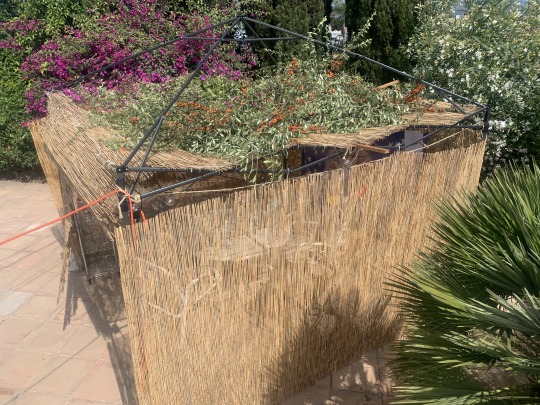
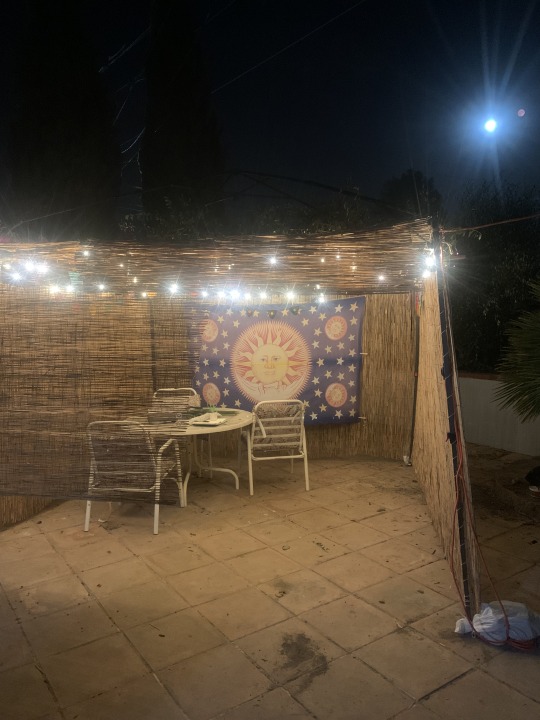
Image description: building the sukkah. A series of five shots, the first two with the person described above wearing a long sleeve green tee and a striped buff straw sunhat on a cloudless sunny day. They use white cotton twine to stitch reed fencing to a metal pop up tent frame, with the top lowered to waist height. The third shot, without people, shows the roof completed and raised to useable height, with flowering bougainvillea and white oleander in the background against a cloudless blue sky. The fourth shot shows the sukkah with walls and an orange outdoor extension cord going into the sukkah. The top has more schach of flowering bougainvillea, pyracantha with orange berries, and an olive-like ornamental covering the roof under the metal frame point. The last shot, at night, shows the interior of the sukkah with a round outdoor table and four patio chairs with cushions inside. Sandbags hold the corners of the sukkah, and a large blue tapestry with a combined sun and moon is pinned to the back wall. Outdoor lights are strung so the sukkah interior glows brightly against the dark night.
Making songpyeon! Songpyeon are as important to Chuseok as a hanukkiah is to Xanike or a seder is to Pesach. They are two to three bite rice cakes traditionally stuffed with sesame seeds, pine nuts, beans, or chestnuts, mixed with honey. They are steamed on pine needles to make a sweet, earthy, chewy treat. I wanted to buy them, but nowhere locally sells them. The white and purple are from our first batch, and the decorated green and purple are from batches six and seven. We had seven batches in 48 hours, and I am grateful my preschooler has been getting plenty of playdough time at school - they were really good at making songpyeon!
A note on togetherness: it is traditional to make songpyeon at home together. I have many memories of the work and stress that went in to pulling off picture-perfect holidays, and while the photographed objects are perfect, the smiles never reach our eyes. I committed to making ugly art and focusing my energy on enjoying time with my four and one year old. I want their foundational memories to be enjoying time together, not me screaming at them to make perfect edible art. It was only on the last batch, when we had an empty afternoon stretching out before us, that we tried some more beautiful candies. I think they turned out great.
The white are plain, the purple is made with blueberry juice, and the green with green tea powder. We stuffed ours with a mix of honeyed pine nuts, honeyed white sesame seeds, and honeyed black sesame seeds. We also made a batch tinted rosy brown with beetroot powder.
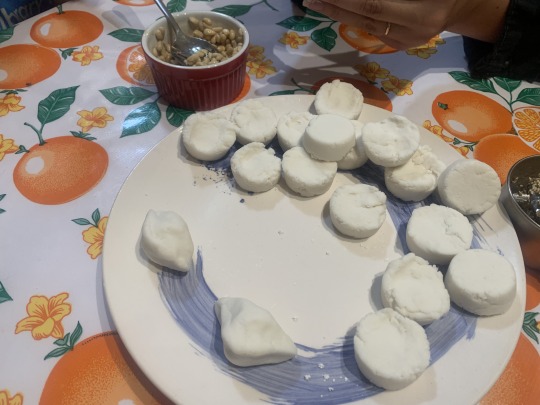
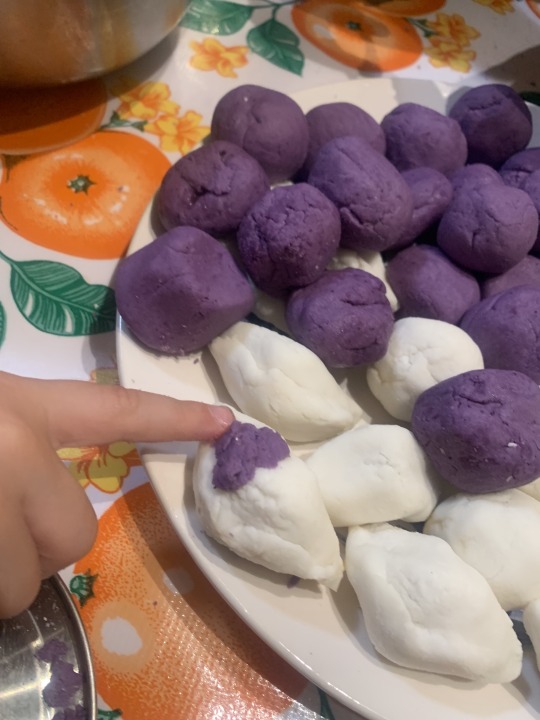
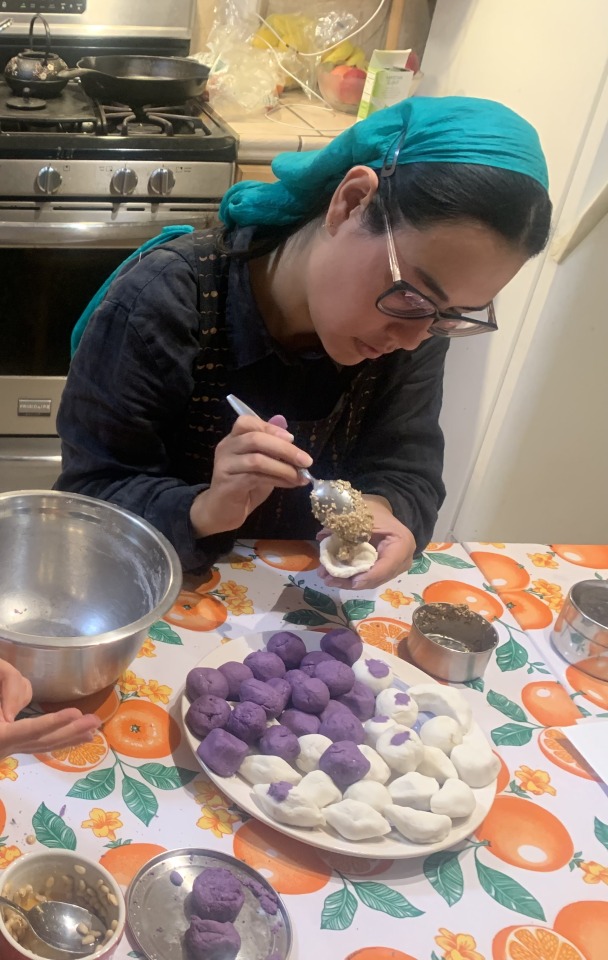
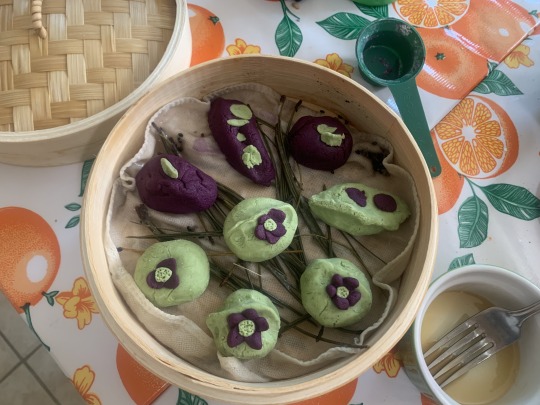
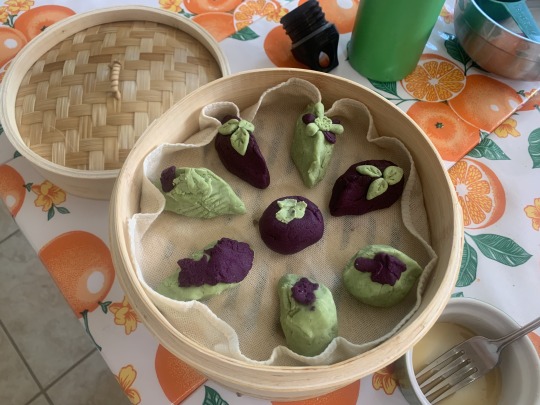
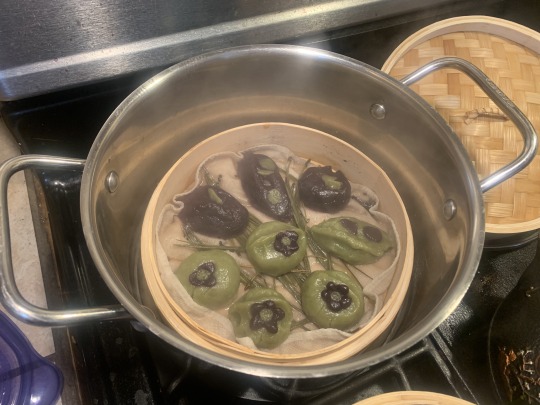
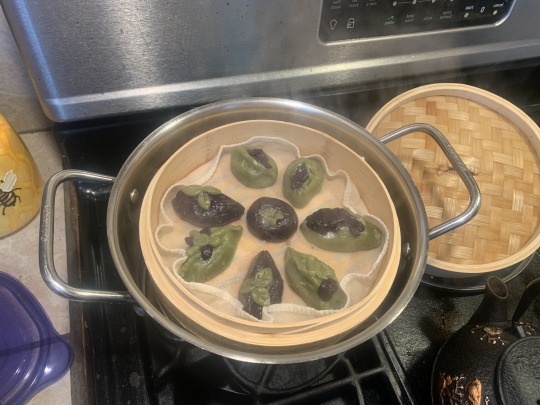
Image description. Set of seven photos showing songpyeon being made. The first three show a plate with measured but unstuffed pieces, shaped pieces, and the same person as above in a black shirt, black apron, and teal tichel using a spoon to stuff a white songpyeon with sesame seeds. These all sit on a table with a large print of orange fruits, leaves, and flowers. The songpyeon are white and purple. Below that is a set of four images with green and purple songpyeon decorated with purple and green flowers to leaves. They are simple in design. The first two show the paler, uncooked pieces sitting on cloth liners and pine needles in a bamboo steamer basket on the table, and the last two are steamy shots showing the cooked pieces, now darker, still in the steamer basket in the pot on the stove.
Some shots of the sukkah just before the triple holiday started: Chuseok, Sukkot, and Shabbat. After all the work I did (plus baking our challah), we got takeout for dinner.
Our lulav is not standard. We don't have an etrog, but a very special lemon our friends grew and gifted us the harvesting thereof. The palm came from our home, and the willow from our friends,' but instead of myrtle I opted for redwood branches (also from our friends' home). These are similarly fragrant, grow in sets of three, and were foragable by me and the baby close to home. I believe there is a balance to be found between traditional observance, and localized observance. It's not right for everyone, but it is right for me and my family.
The table with with shabbat candlesticks and food is our jesa table. Jesa is an ancestor veneration ceremony in which food and bows are offered to the ancestors. They consume the energy from the food, and leave their blessings behind. When we consume the food, we receive the blessings. For more on traditional Korean practices, I recommend popping over to instagram to follow Mudang Mia, Mudang Jenn (who has a free digital magazine), and Mudang Seo Choi (who regularly has kickstarters for books!).
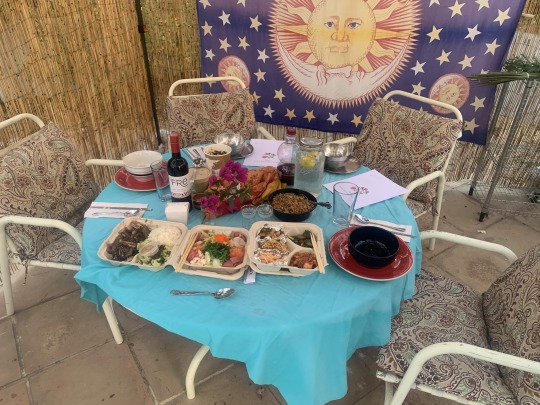
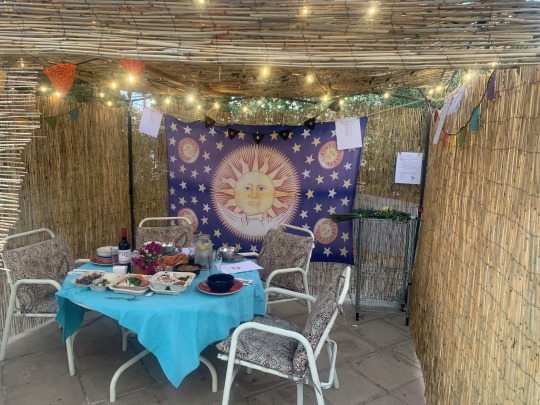

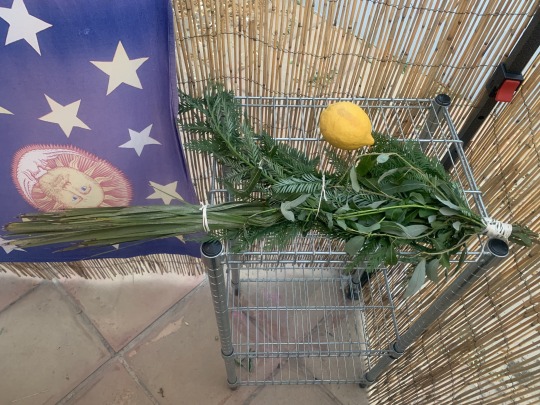
Image description. Four shots of the sukkah interior, showcasing the food. First shot shows a table set for two adults and two children, with printed homemade colouring books at each child's place setting, The table has a blue tablecloth, three takeout boxes of food, a takeout container of fried rice, a small floral arrangement, a challah wrapped in a red and gold cover with bees woven in, a bottle of de-alcoholized red wine, a bottle of pomegranate juice, a large jar of lemon water, and takeout containers for soup. The second shot is the same set but pulled back and showing the whole interior so the lulav table relative to eating table is visible. The third shot is a very narrow table with a blue cloth printed with smiling white suns on it. It has two glass shabbat candlesticks, a package of beeswax candles, a stack of five coconut jellies, chopsticks, and a plate with homemade songpyeon in white, rosy brown, and purple, white mochi with red bean paste, and three cylindrical puffed rice snacks. The fourth shot is of the lemon and lulav bundle as described above. The lulav is wrapped and tied with white cotton twine.
Bonus: the video I made, with voiceover available on instagram.
You aren't alone.
moadim l'simcha.

Image description: a twig with flowering pomegranate in various stages for seven buds and blossoms total. It has a large white circle behind. Collaged on top are three rounds of moon cycles, spiraling in towards the center in black.
#sukkah#sukkot#succos#sukkos#chuseok#jesa#jewish#judaism#earth based judaism#jewish art#queer art#mixed race art#mixed race#hanbok#jewish witch#witch sukkah#queer joy#jewish joy#mixed race joy#asian joy#songpyeong#lulav#homemade#handmade#the fifth acre
7 notes
·
View notes
Text
When Putin invaded Ukraine I did not get an email in my inbox telling me the Homeland was in trouble and what I could do to help—Ukraine did not take it as a given that I, some 130 years removed from ancestral emigration from family line with over a century of settled citizenship in a different country, felt intrinsic kinship ties. Equally a few weeks ago when Parliament honoured a WWII Ukrainian war veteran, only to backpedal in a panic when they realized he'd served in the volunteer Ukrainian division of the Waffen-SS, nobody found me guilty by association when the discourse turned to a broader discussion of the realities of the Ukrainian alt-right.
But a couple days ago when Hamas breached the 6 billion dollar boondoggle of a border wall that imprisons Gaza, they didn't say they came to kill Israelis—a diverse group comprised of first-to-fourth generation immigrants from Europe, the Americas, and Africa; Mizrahim; Samaritans; Arabs; and Druze (among others). They just said they came to kill Jews. When Pro-Palestinian marches broke out in major cities, many had to be publicly reprimanded for their antisemitism: it wasn't a march against Israelis, it was a march against Jews.
And when my rabbi sent out emails about supporting the 'Holy Land' it was to donate to an IDF Veterans charity because the IDF—the armed forces of the Middle Eastern nation-state of Israel of which I am not a citizen— have done 'so much for Jews worldwide.'
I have never been to Israel. I have never had a desire to visit Israel, it being semi-arid, dry, and singularly uninviting place. Some 40 generations back the ancestors of my ancestors of my ancestors would have departed the region—perhaps after the loss of the Second Temple in the year 70, or the failure of the Bar Kokhba revolt in 132, or perhaps even further back, in one of the diasporas centuries before (over the last three thousand years most Jews have spent more time everywhere but Israel.)
I am not an Israeli: not by birth, not by citizenship, not by any of the normal, standard criteria we culturally attach to immigrant status centuries upon centuries removed. But I want you to imagine if the United Kingdom got invaded tomorrow and you woke up to an e-mail asking you to support the Royal Marines because your ancestor was a charcoal burner outside of Londonium in the reign of Domitian.
I am not an Israeli, but the anti-Semites chanting in the streets and my rabbi treat me as functionally indivisible from one anyway. Consciously or unconsciously you probably do too. A Catholic might be asked to answer for the crimes of the Vatican, but a sixth generation Catholic from Boston isn't going to be asked to answer for the crimes of Spain—or Ireland, for that matter. But a 40-generation removed Jew cannot escape answering for Israel.
You know, my great-grandfather lived through his Ukrainian relatives being slaughtered in a pogrom before the end of the first world war. His own Yiddish-speaking father never learned more than few words of English, had to go out of his way to have shabat and seders with the handful of other Jews who lived in Nowhere, Northern Ontario, but my great-grandfather became so afraid of his own Judaism that he threw himself into one of the stranger and more noxious Christian cults of the 19th century, one that would kill many of his children—and left it to his grandchildren and great-grandchildren to try and pick up the pieces puzzle-out why they had a last name that made Eastern Europeans frown when they heard it.
He left us a diaspora within a diaspora within a diaspora, groping blind to find our way back to some kind of identity. It feels hard enough at times to accept the label of 'Jew' when you don't have a Hebrew name, when you mumble your way through a mahzor squinting at the phonetic prayers (acutely aware that you don't know the right times to sit or stand, much less bow), when your sense of lineage—your sense of tribe, of a past—ends in the burnt rubble of a synagogue on the banks of the Smotrych.
It feel impossible, some days, to be a Jew simply within the framework of 'being a Jew,' whether you are practicing Judaism as a religion or go about your life with the genetic markers of ethnicity. It feels forever like there are so many ways to get it wrong, that it is all in some sense a performance that—if you fuck up even a little bit—you're diminishing Jews as effectively as any pogrom. The degree to which self-hating Jew as a term is weaponized is astounding, the degree to which 'being correctly Jewish' is a conscious act of will at times exhausting.
I struggle to find my sense of place as a Jew, as a descendant of Jews, who were often hunted, slaughtered, oppressed, and extinguished. And to all this is added Israel, is added ethno-nationalism, is added the genocidal constitution of Hamas and the bombs and jet planes of the IDF. Three days ago Hamas committed mass-murder: a thousand dead, others kidnapped, children gunned down in the streets. In three days since the IDF has displaced over 230000 Gazans by bombing their homes, children blown-up in the streets. The street marchers shout 'death to Jews.' My rabbi wants me the beef-up the bombers pensions. All over a plot of land I have never visited and have no wish to see.
This doesn't come to any kind of cathartic or intriguing rhetorical finale. I have no doubt it reads as nigh-incoherent. I've been writing it for hours, picking away at it, poking and prodding with an anguish I can't articulate. I sit here and write it on the knife-edge of privilege: I am not an Israeli under threat of a Hamas bullet, nor am I Gazan under threat of an IDF bomb. Yet the privilege is still a knife-edge, still a liminal state—because when we set-up for the Hanukah celebrations this winter, the police presence around us will be there for very different reasons than they were at the Santa Claus parade the week before. To be Jewish is already to live with conditional assimilation: I am not Israeli, I have no desire to be Israeli, O hold Israel and its policies against the Palestinians these past decades to be an incalculable injustice. Yet none of that matters to the white supremacist tomorrow who feels that now is the best time to kill some local Jews to preserve the purity of his ethno-state—because he's drawing on the biggest up-swell of antisemitic sentiment in a generation.
I am not an Israeli, I have no wish to be, and yet every Jew outside Israel the world over will still feel less safe tomorrow and in the days to come—because to the world at large, that doesn't matter.
6 notes
·
View notes